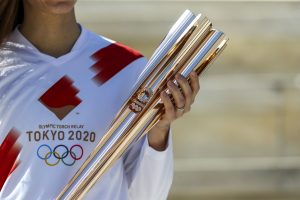With exactly one month until the start of the Tokyo Olympics and the state of emergency lifted across 11 prefectures, the Japanese government has decided to allow up to 10,000 domestic spectators or 50 percent of venue capacity – contrary to the advice of health experts.
Prime Minister Suga Yoshihide insists the Games can be staged successfully in a “safe and secure” manner and the Tokyo Organizing Committee has prepared guidelines for spectators, which include banning singing, shouting, and cheering.
But experts in Japan have continued to warn that the Tokyo Olympics could lead to a surge in coronavirus infections. The National Institute of Infectious Diseases stressed that if the emergency declaration is lifted too early, the number of new daily infections in Tokyo could exceed 1,000 in late July or early August, immediately after the opening of the Olympics.
Toward the end of the state of emergency on June 20, there was an increase in the number of people out and about in downtown areas. Tokyo is currently seeing an uptick of COVID-19 infections and recorded 435 new infections on Tuesday, which is 98 cases more than the week before. The current rate of infection is raising fears of an impending COVID-19 rebound or a “fifth wave” in the capital.
The government’s rush to lift the state of emergency before daily infections have been brought under control has been criticized as a repeat of the decision-making that led to the rebound seen after the previous state of emergency was lifted in February. The Tokyo Medical Association has stressed the need to see infections fall below 100 cases per day over seven days before a state of emergency can be lifted. Chairman Ozaki Haruo called the decision to invite spectators to attend the Olympics “incomprehensible” under the current coronavirus pandemic.
In an effort to prevent the spread of COVID-19, seven of Japan’s worst affected prefectures, including Tokyo and Osaka, have switched to “priority countermeasures” until July 1. Priority countermeasures largely resemble a state of emergency and include restrictions on the number of spectators at large-scale events, requests that bars and restaurants shorten business hours to close at 8 p.m., and limits on the serving of alcohol. Suga has urged the public to support the athletes by watching the Games from home and warned that the decision on domestic spectators could change if COVID-19 infections worsen.
The latest coronavirus restrictions are a major blow to the struggling hospitality sector, which was anticipating a loosening of restrictions in the run up to the Olympics. Restaurants, taverns, and bars are considered a major source of COVID-19 transmission. Business owners cooperating with government-mandated coronavirus measures have been offered an allowance ranging from approximately $4,700 to $38,000, or can face fines of up to $2,700 for non-compliance.
On Tuesday the Tokyo Organizing Committee announced the decision to allow the sale of alcoholic beverages at Olympic venues, having signed an exclusive contract with gold Olympic sponsor Asahi Breweries. But the decision was quickly shelved after an avalanche of social media outrage from residents, restaurants, and bars criticizing the move as giving preferential treatment.
The Olympic Games is traditionally an advertising extravaganza, with publicity booths set up around the stadium. Some 60 Japanese companies paid $3 billion to sponsor the Games and a further $200 million to extend contracts following the one-year postponement. Without spectators, the Olympics organizing committee would not only lose an estimated $820 million in ticket revenue but could also lose favor with major sponsors who face continued uncertainty.
On Monday, during a five-way virtual meeting between the International Organizing Committee (IOC), Tokyo Organizing Committee, International Paralympic Committee, Japanese government, and Tokyo metropolitan government, the push for domestic spectators appears to have been led by the Japanese side. IOC President Thomas Bach stated in his opening speech that he was “looking forward to hearing the decision on the spectator limit… and even before we hear it, the IOC will support the decision of the Japanese people.” Despite the heightened risk of infection, appeasing Japanese sponsors and recovering losses appears to be a major undercurrent on the decision to accept some domestic spectators.
Whether or not measures to curb infections prove a success, IOC officials are determined to move forward with the opening of the Games. In May IOC Vice President John Coates made controversial remarks to a U.K. media outlet saying that “unless it’s an Armageddon, the Olympics can be held.” Coates’ attitude was criticized as being disrespectful to Japanese people and further fueled public calls for cancelling the Games.
As preparations enter their final phase, the biggest remaining challenge is finalizing reinforcements for Japan’s medical system during the Olympics.
































